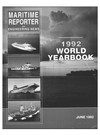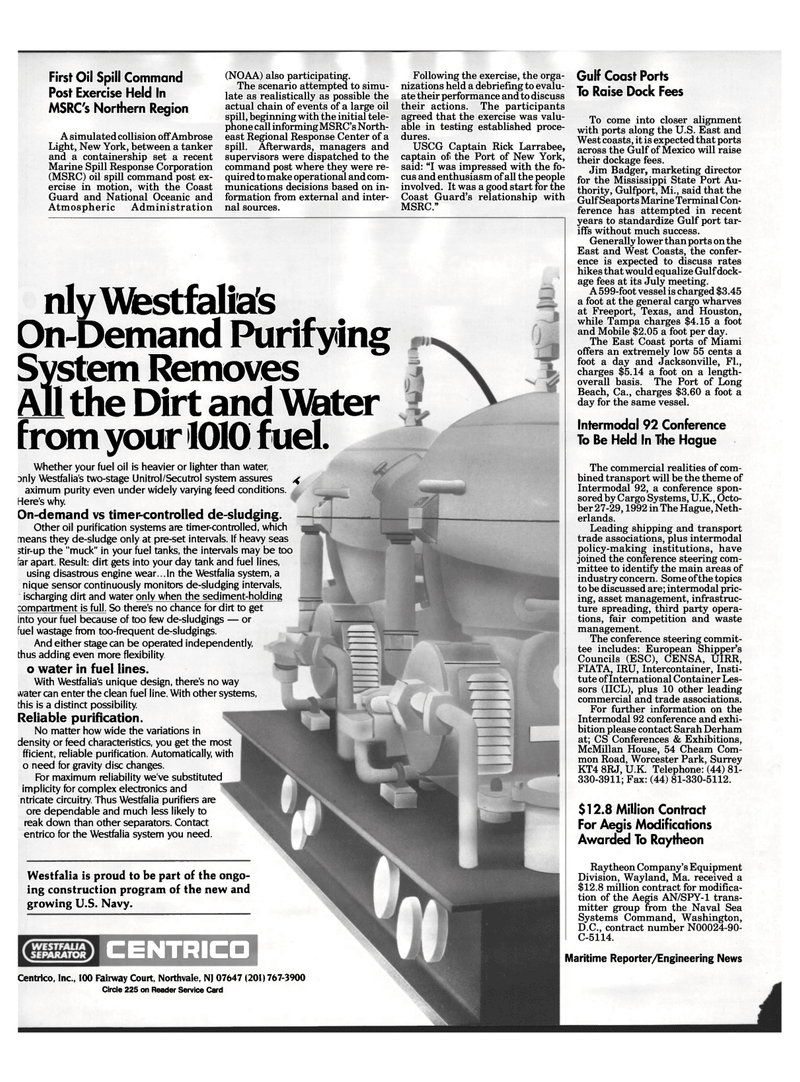
Page 76: of Maritime Reporter Magazine (June 1992)
Read this page in Pdf, Flash or Html5 edition of June 1992 Maritime Reporter Magazine
CENTRICO
Centrico, Inc., 100 Fairway Court, Northvale, NJ 07647 (201)767-3900
Circle 225 on Reader Service Card
First Oil Spill Command
Post Exercise Held In
MSRC's Northern Region
A simulated collision off Ambrose
Light, New York, between a tanker and a containership set a recent
Marine Spill Response Corporation (MSRC) oil spill command post ex- ercise in motion, with the Coast
Guard and National Oceanic and
Atmospheric Administration (NOAA) also participating.
The scenario attempted to simu- late as realistically as possible the actual chain of events of a large oil spill, beginning with the initial tele- phone call informing MSRC's North- east Regional Response Center of a spill. Afterwards, managers and supervisors were dispatched to the command post where they were re- quired to make operational and com- munications decisions based on in- formation from external and inter- nal sources. $12.8 Million Contract
For Aegis Modifications
Awarded To Raytheon
Raytheon Company's Equipment
Division, Wayland, Ma. received a $12.8 million contract for modifica- tion of the Aegis AN/SPY-1 trans- mitter group from the Naval Sea
Systems Command, Washington,
D.C., contract number N00024-90-
C-5114. 78 Maritime Reporter/Engineering News
Westfalia is proud to be part of the ongo- ing construction program of the new and growing U.S. Navy.
Gulf Coast Ports
To Raise Dock Fees
To come into closer alignment with ports along the U.S. East and
West coasts, it is expected that ports across the Gulf of Mexico will raise their dockage fees.
Jim Badger, marketing director for the Mississippi State Port Au- thority, Gulfport, Mi., said that the
Gulf Seaports Marine Terminal Con- ference has attempted in recent years to standardize Gulf port tar- iffs without much success.
Generally lower than ports on the
East and West Coasts, the confer- ence is expected to discuss rates hikes that would equalize Gulf dock- age fees at its July meeting.
A 599-foot vessel is charged $3.45 a foot at the general cargo wharves at Freeport, Texas, and Houston, while Tampa charges $4.15 a foot and Mobile $2.05 a foot per day.
The East Coast ports of Miami offers an extremely low 55 cents a foot a day and Jacksonville, Fl., charges $5.14 a foot on a length- overall basis. The Port of Long
Beach, Ca., charges $3.60 a foot a day for the same vessel.
Intermodal 92 Conference
To Be Held In The Hague
The commercial realities of com- bined transport will be the theme of
Intermodal 92, a conference spon- sored by Cargo Systems, U.K., Octo- ber 27-29,1992 in The Hague, Neth- erlands.
Leading shipping and transport trade associations, plus intermodal policy-making institutions, have joined the conference steering com- mittee to identify the main areas of industry concern. Some of the topics to be discussed are; intermodal pric- ing, asset management, infrastruc- ture spreading, third party opera- tions, fair competition and waste management.
The conference steering commit- tee includes: European Shipper's
Councils (ESC), CENSA, UIRR,
FIATA, IRU, Intercontainer, Insti- tute of International Container Les- sors (IICL), plus 10 other leading commercial and trade associations.
For further information on the
Intermodal 92 conference and exhi- bition please contact Sarah Derham at; CS Conferences & Exhibitions,
McMillan House, 54 Cheam Com- mon Road, Worcester Park, Surrey
KT4 8RJ, U.K. Telephone: (44) 81- 330-3911; Fax: (44) 81-330-5112.
OnlyWestfalia's On-Demand Purifying
System Removes M the Dirt and Water from your 1010 fuel.
Following the exercise, the orga- nizations held a debriefing to evalu- ate their performance and to discuss their actions. The participants agreed that the exercise was valu- able in testing established proce- dures.
USCG Captain Rick Larrabee, captain of the Port of New York, said: "I was impressed with the fo- cus and enthusiasm of all the people involved. It was a good start for the
Coast Guard's relationship with
MSRC."
Whether your fuel oil is heavier or lighter than water, anly Westfalia's two-stage Unitrol/Secutrol system assures ^ maximum purity even under widely varying feed conditions.
Here's why.
On-demand vs timer-controlled de-sludging.
Other oil purification systems are timer-controlled, which means they de-sludge only at pre-set intervals. If heavy seas stir-up the "muck" in your fuel tanks, the intervals may be too
Far apart. Result: dirt gets into your day tank and fuel lines, musing disastrous engine wear...In the Westfalia system, a unique sensor continuously monitors de-sludging intervals, discharging dirt and water only when the sediment-holding compartment is full. So there's no chance for dirt to get into your fuel because of too few de-sludgings — or
Fuel wastage from too-frequent de-sludgings.
And either stage can be operated independently, thus adding even more flexibility.
No water in fuel lines.
With Westfalia's unique design, there's no way water can enter the clean fuel line. With other systems, this is a distinct possibility.
Reliable purification.
No matter how wide the variations in density or feed characteristics, you get the most efficient, reliable purification. Automatically, with no need for gravity disc changes.
For maximum reliability we've substituted simplicity for complex electronics and intricate circuitry. Thus Westfalia purifiers are more dependable and much less likely to break down than other separators. Contact
Centrico for the Westfalia system you need.

 75
75

 77
77
